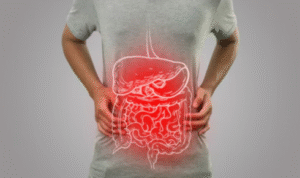
Are you exhausted and feel fatigued when your friends are active and energetic? Do you have a hard time losing weight while your friends are fit? And yes, the typical answers to these questions are eating healthy and working out. But the reality is that it’s your gut microbiome.
Your gut is home to millions of microbes that assist in digesting your food, absorbing the nutrients, and keeping you healthy. These microbiomes also have a large part in regulating your mood, immunity, and energy. What’s more, recent research highlights a significant connection between gut microbiome and weight loss, indicating that your gut health also plays a role. Let’s discover what the gut microbiome is, why it’s important, and much more.
What is the Gut Microbiome?
Trillions of bacteria, viruses, fungi, and other microorganisms inhabit the digestive tract, called the gut microbiome. Generally, good bacteria aid digestive health. We rely on them for producing essential vitamins, absorbing nutrients, and breaking down complex foods. Your gut microbiota can be healthy if you maintain a combination of lifestyle, environment, nutrition, and genetics.
This microbial community acts as an individual organ inside the body. This regulates digestion, immunity, metabolism, and more behind the scenes. So, indirectly, gut health and digestion result in weight and energy balance. It also impacts how your body stores and uses food for energy.
Why is the Gut Microbiome Essential?
A robust gut microbiome promotes digestion and serves as the foundation for countless functions in your body.
- Regulating Metabolism: Certain gut bacteria influence how calories are stored and absorbed.
- Vitamin Synthesis: Microbes generate essential vitamins to boost bone strength and energy.
- Immune System Support: About 70% of your immune system lives inside your gut. If your gut is healthy, then infections and chronic inflammation can be prevented.
- Mind and Body Connection: Your brain and gut communicate via the gut-brain axis. If your gut is off, you might experience chronic fatigue and brain fog. If it’s nutritious, then it induces brain power, concentration, and an even temper.
So understanding how gut health affects energy is key to figuring out your microbial equilibrium.
What Are the Factors That Can Affect Your Gut Microbiome?
Numerous factors influence your gut microbiome’s diversity and balance. They are:
1) Diet: A high-fiber diet with abundant fruit, vegetables, whole grains, and legumes forms a great habitat for good bacteria. Diversity of microbes can be disrupted by the consumption of processed carbohydrates, processed foods, and unhealthy fats.
2) Use of Antibiotics: Usually, antibiotics would come as a salvation, but they would prove a perturbation of the intestinal ecosystem since they would eliminate the detrimental bacteria as well as the good ones.
3) Stress: Chronic stress impairs the functioning of the gut and the balance of the microbes, which hinders digestion and nutrient absorption.
4) Sleep Habits: Unsatisfactory or unconventional sleep influences the circadian cycle of enteric microbes, thus affecting metabolism as well as energy control.
5) Physical Activity: Continuous physical exercise results in an active gut microbiome, but physical inactivity has been linked with reduced microbial activity.
6) Hydration: Drinking only a limited quantity of water diminishes the speed of digestion, and the digestive bacteria become less effective at decomposing the nutrients.
If you experience chronic digestive diseases, you must find the best gastroenterologist in Coimbatore for state-of-the-art treatment and professional guidance.
How to Improve Your Gut Health for Better Energy?
Although it is important to have a healthy gut, certain lifestyle choices should be maintained consistently. These are some of the steps you can take that are practical:
- Consume a Wide Variety of Food: Your diet ought to be made up of high-fiber items like vegetables, fruits, legumes, whole grains, and nuts.
- Add High Probiotic Foods to Your Diet: Beneficial bacteria present in some dairy products, kimchi, and other fermented foods not only maintain but also help the microbiome to be restored.
- Do Not Forget to Drink Water: The regular intake of water allows microbial growth, digestion, and nutrient transfer.
- Take Care of Your Sleep: The body and the microbiome can only be maintained naturally with 7 to 8 hours of good-quality sleep.
- Manage Stress: The meditative practice of yoga, breathing exercises, and meditation in general are helpful in the healing of the gut that is impaired due to distress.
- Do Some Exercise Regularly: It has been found by scientific research that regular physical activities like cycling, jogging, or weight training can increase the diversity of the microbes and the metabolic health.
- Stay away from Processed Foods: Stop eating food that is low in nutrients and high in sugar and fried food, also with artificial preservatives and which can cause the overgrowth of harmful bacteria.
If you require top-class therapy to make your gut healthier, the best gastro hospital in Coimbatore offers trustworthy treatment, proper diagnosis, and care that brings the gut back to strength and balance.
Conclusions
Finally, the collection of microbes in your gut is the basis of your metabolism, your energy, and your health. A resilient and unique microbiome provides your body with vitality, immunity, and mental wellness. Gut microbiome imbalance can also result in weight fluctuations and make you feel tired.
So, hopefully, this blog will guide you on the gut microbiome’s role in controlling weight and energy levels. Lifestyle hacks like exercise, prebiotics and probiotics, healthy eating, and adequate sleep can help you get your gut back on track.












